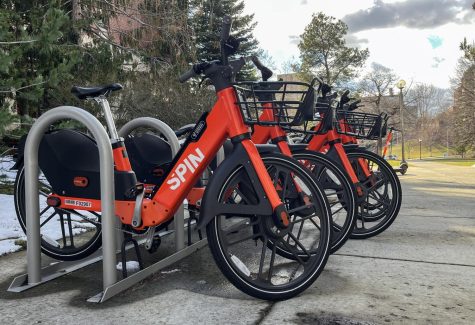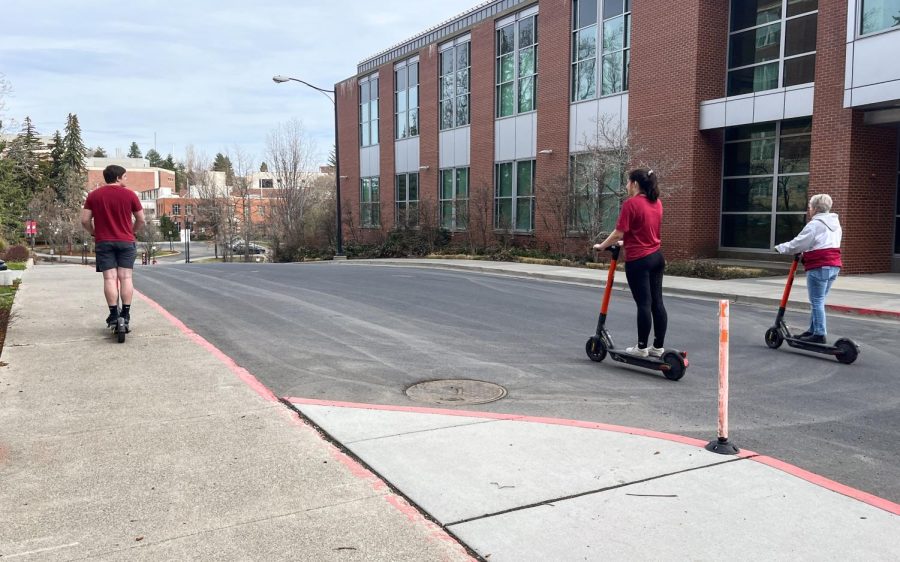SPIN: An easier way to get around campus
An introduction to mirco-mobility at WSU
Students riding eScooters, Monday, April 10, 2023.
April 11, 2023
WSU has partnered with SPIN to bring the campus eBikes and eScooters to students.
The reason for this change mainly stemmed from the company that ran Coug Bikes “Bolt” going bankrupt, said Jonathan Stahl, an associate director for university referees.
Matt Wagner, coordinator for the Outdoor Rental Center for university recreation, said another reason for this change was the fact that Coug Bikes was a system that no longer worked for students.
He said the system began to be managed poorly until it was no longer usable.
Students on campus knew the issues Coug Bikes brought when it came to trying to use them on campus due to the hills WSU is built on, which is another reason WSU moved to use micro-mobility, which are lightweight electronic assisted vehicles, Wagner said.
“They’re just a more user-friendly system for getting up hills and getting from like all around campus,” Wagner said.
One significant issue that was discovered with the old system was the surplus of bikes located in downhill hill areas because students did not want to ride them up the hills, he said.
With the new eBikes and eScooters WSU is hoping that this issue will decrease now that the micro-mobility makes it easier for students to go up and down hills.
He said they were approached by Stevie Fawcett the chair of the Environmental Sustainability Alliance who was excited when looking into getting SPIN eBikes and eScooters.
Former ASWSU President Brian Patrick and Sam Gerlach, former ASWSU member, Stahl, the previous facilities director Jeff Elbrick and Gabby Rodriguez from transportation services, were the ones involved in the micro-mobility group put together to see what they were looking for to replace Coug Bikes, Stahl said.

SPIN eBikes, Monday, April 10, 2023.
One of the major aspects of the new SPIN bikes and scooters is that it is costing the university and students less money, Stahl said.
Stahl said that students will only be charged directly for use whereas in the past with other systems students who did not even use the system would have to pay for it.
It costs only $1 to unlock the bike or scooter and 29 cents per minute when driving around, he said.
It cost WSU $11,000 a month to lease 100 Coug Bikes, however during winter months when the bikes were hibernating they paid less. In total Coug Bikes cost $125,000 a year, Stahl said.
“They also paid us a small monthly fee to maintain the bikes and redistribute them around campus,” he said.
Stahl said this meant that WSU had to hire, train and pay student bike mechanics and attendants to operate Coug Bikes.
WSU also paid $40,000 in bike racks for the Coug Bikes, he said.
To ride the vehicles SPIN has a feature that requires the rider to take a safety quiz and helmets are encouraged, Wagner said.
How fast someone can ride the bikes and scooters depends on the area in which they are on campus. On Terrell Mall, the speed limit maximizes out at 6 miles per hour, and in more open areas on campus out to 12 to 15 miles per hour, he said.
The demand for micro-mobility was quite high and with them also came environmental efforts, Stahl said.
“The idea of these things is trying to limit the number of trips people are taking by car driving around and just making getting around easier for students,” Stahl said.












